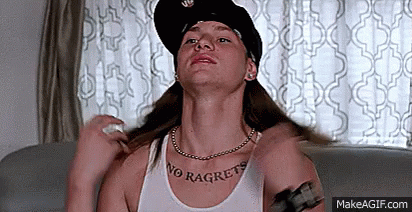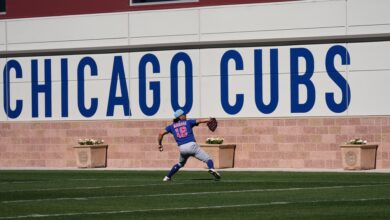
Addison Russell’s Failure to Acknowledge Ill-Advised Throw Symptom of Bigger Issues
You don’t need the deductive reasoning skills of Sherlock Holmes, or even the sixth sense possessed by most parents, to understand what’s going on with the Cubs. Heck, in cases like Tuesday night, when mental errors and sloppy baseball bit them in the rear yet again, one of the guilty parties unwittingly told you what he’d done. Then he doubled down on it.
The Cubs had already fought through the utterly predictable plot twist of Yu Darvish giving up an early lead and then allowing a home run to Josh Bell to break a tie a couple innings later. But when Victor Caratini came up with a go-ahead homer of his own, it actually seemed for a moment as though someone may have rewritten the script.
And when Craig Kimbrel entered the game, there was legitimate hope the Cubs might actually author a feel-good ending to a series of events that had seen them at their low point. As ugly as the 2-7 start looked on paper, it was too early in the season and was quickly washed away. The Cubs at least seemed angry or a little confused then; now they just feel tired and anxious.
Through three days in Pittsburgh, they’ve had a players-only meeting, a Joe Maddon-led meeting, and Theo Epstein threatening to turn the car around if these metaphorical kids don’t knock it off. So if he was serious about change needing to take place if the Cubs continued to play like they have, well, he got a pretty solid example in the 9th inning.
Kimbrel coaxed a grounder to open the inning, then lost the powerless Elias Diaz with two balls in a 2-2 count. Then his backdoor curve to Jung Ho Kang was lofted toward the line in right, where Willson Contreras was playing as both Jason Heyward and Kris Bryant sat with minor nicks. A great throw earlier in the game had proven his mettle out there, but Contreras was well off the line and doesn’t have Heyward’s jumps or reads.
So a ball that left Kang’s bat at 77.8 mph and registered an expected batting average of .040 dropped safely and scooted past the sprinting Contreras for a double. The Pirates had men on second and third with one out, so the Cubs played the infield back to ensure the out at first. They were conceding the tying run, but it would at least limit the Pirates’ ability to take the lead.
Not everyone got the memo.
Adam Frazier dribbled a first-pitch fastball over to the right side for what should have been the second out of the inning. Rather than toss to Anthony Rizzo for the sure out, however, Addison Russell scooped the ball and hesitated slightly before unleashing a sidearm whip home that sailed high, wide, and late. The Pirates would go on to win the game on a sac fly three pitches later.
Throwing home was never the play, especially not for a second baseman with just an okay arm. Between the relatively soft hit, Russell having to range to his left, and the hesitation, the play should not have unfolded the way it did. There’s also the idea that the Cubs were set up very specifically to not make the play at home on the infield.
But either no one relayed that message to Russell or he simply didn’t give a damn about it.
“I’m pretty much thinking home before the play even developed,” Russell said after (Twitter links) the game. “I think personally I was just a little bit too far back, and I had to move to my left. It would’ve had to be a perfect play. I don’t regret my decision going home.”

Were it any other player, the utter lack of accountability might be surprising. Russell made an awkward attempt to spin his poor choice by calling it a “huge” learning experience for him as he continues to acclimate to a new position. That holds water, right? I mean, he’s only played [pause to check the stats] 985 innings there at the major league level.
Even if he’d just been shifted over for the first time in his life as a late defensive replacement, his instincts should have been screaming at him not to make that play. Failing that, the Cubs’ defensive alignment told literally every single person watching or listening that the play was to first.
“We were playing for the out and he threw the ball to the plate, and that kind of messed things up a little bit,” Maddon said afterwards. “If the ball’s hit hard, you have a shot at it. Otherwise, just get the out.”
Knowing how reluctant Maddon is to call his players out publicly, this is a very serious critique. At the same time, it’s very obvious because there’s simply no other way to view it. But as clear as the mistake was on the field, this may not be a situation in which the full weight of blame lies with Russell. Had Maddon and/or his staff not been crystal clear about what the infielders were to do, they own a measure of guilt.
Though he’s frequently displayed preternatural skill via quick reflexes and slick footwork, Russell has shown on many occasions that he’s not possessed of the highest baseball IQ. The fact that he was thinking home the whole way is an indictment of his decision-making skills, the shoddy nature of which the Cubs must surely be aware. It’s on the staff, perhaps even Rizzo and other teammates, to make sure Russell knows what’s going on.
That clearly didn’t happen and I want to come back to the idea of simple detective work, or the parental tactic of asking two kids for their sides of the story, to close this out. You don’t have to have a great analytical mind to see that something isn’t right with the Cubs. All you need to do is listen to two different people tell their sides of the story and you realize all too quickly that this team isn’t working as one.
Or worse, that they’re actively working against one another even if they’re not fully aware of that conflict.
Epstein talked about that Wednesday afternoon, lamenting a lack of identity and a failure to really come together and play good team baseball for long stretches. The problem is bigger than one play or player, but Russell’s inexplicably poor decision and his inability to comprehend or acknowledge its wrongness in retrospect is an all-too-common example of how this team has lost its way.
“It’s not acceptable,” Epstein said of the Cubs’ current level of play. “There have been too many words about it and not enough action. There’s nothing I can say, especially on a radio interview, to make it better. It’s incumbent on all of us to find ways out of it.
“And obviously on our end, a big part of that is transcational. It’s the time of year to do that. Change is obviously called for if we keep playing like this.”
The only question now is whether Epstein will really make good on his promise to turn this car around if the team continues to act up.

